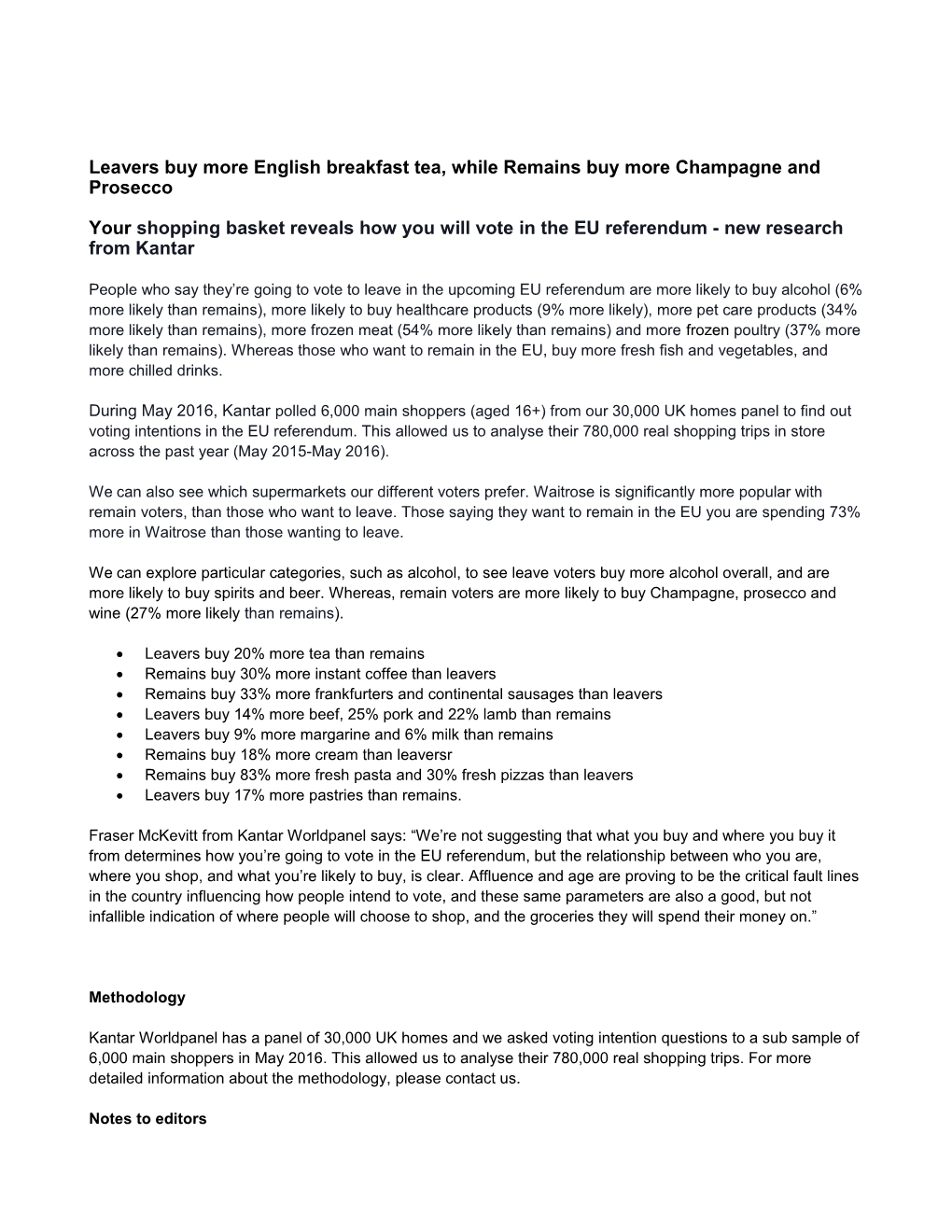1
Leavers buy more English breakfast tea, while Remains buy more Champagne and Prosecco
Your shopping basket reveals how you will vote in the EU referendum - new research from Kantar
People who say they’re going to vote to leave in the upcoming EU referendum are more likely to buy alcohol (6% more likely than remains), more likely to buy healthcare products (9% more likely), more pet care products (34% more likelythan remains), more frozen meat (54% more likelythan remains) and morefrozenpoultry (37% more likelythan remains). Whereas those who want to remain in the EU, buy more fresh fish and vegetables, and more chilled drinks.
During May 2016, Kantar polled 6,000 main shoppers (aged 16+) from our 30,000 UK homes panel to find out voting intentions in the EU referendum. This allowed us to analyse their 780,000 real shopping trips in store across the past year (May 2015-May 2016).
We can also see which supermarkets our different voters prefer. Waitrose is significantly more popular with remain voters, than those who want to leave. Those saying they want to remain in the EU you are spending 73% more in Waitrose than those wanting to leave.
We can explore particular categories, such as alcohol, to see leave voters buy more alcohol overall, and are more likely to buy spirits and beer. Whereas, remain voters are more likely to buy Champagne, prosecco and wine (27% more likelythan remains).
- Leavers buy 20% more tea than remains
- Remains buy 30% more instant coffee than leavers
- Remains buy 33% more frankfurters and continental sausages than leavers
- Leavers buy 14% more beef, 25% pork and 22% lamb than remains
- Leavers buy 9% more margarine and 6% milk than remains
- Remains buy 18% more cream than leaversr
- Remains buy 83% more fresh pasta and 30% fresh pizzas than leavers
- Leavers buy17% more pastries than remains.
Fraser McKevitt from Kantar Worldpanel says: “We’re not suggesting that what you buy and where you buy it from determines how you’re going to vote in the EU referendum, but the relationship between who you are, where you shop, and what you’re likely to buy, is clear. Affluence and age are proving to be the critical fault lines in the country influencing how people intend to vote, and these same parameters are also a good, but not infallible indication of where people will choose to shop, and the groceries they will spend their money on.”
Methodology
Kantar Worldpanel has a panel of 30,000 UK homes and we asked voting intention questions to a sub sample of 6,000 main shoppers in May 2016. This allowed us to analyse their 780,000 real shopping trips. For more detailed information about the methodology, please contact us.
Notes to editors
Contact: Claire Davies, Editor and Head of Content
0207 6565313 or 07827 984271
Kantar UK Insights showcases all the best data on Britain held by Kantar and its subsidiary companies. It offers journalists an instantly accessible free database of deep statistics and expert commentary on public opinion, business, tech and consumer issues.
About Kantar
Kantar is the data investment management division of WPP and one of the world's largest insight, information and consultancy groups. By connecting the diverse talents of its 12 specialist companies, the group aims to become the pre-eminent provider of compelling and inspirational insights for the global business community. Its 28,500 employees work across 100 countries and across the whole spectrum of research and consultancy disciplines, enabling the group to offer clients business insights at every point of the consumer cycle. The group’s services are employed by over half of the Fortune Top 500 companies. For further information, please visit us at
